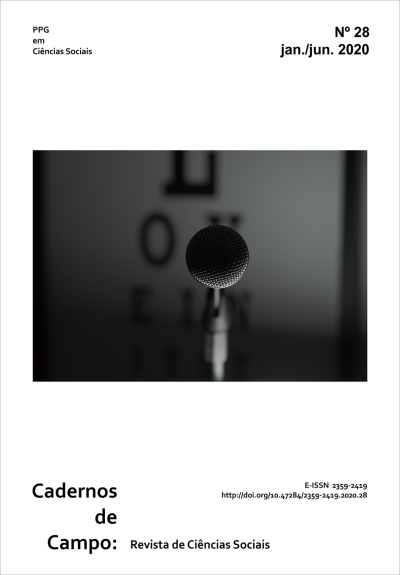Populismo: o grande levante semiótico
DOI:
https://doi.org/10.47284/2359-2419.2020.28.4775Palavras-chave:
Atrator, Eleições, Enunciação, Legitimação, Paixões, Povo, Populismo,Resumo
Populismo e populista são denominações que, ao mesmo tempo, são mal definidas – até indefiníveis – e cuja enunciação é, no entanto, eficiente. O argumento inicial deste estudo consiste em uma inversão dessa relação: é justamente por essa indeterminação que a enunciação é eficiente. A dificuldade de uma definição estável de populismo é uma consequência direta da transformação contemporânea do actante coletivo, ao qual chamamos povo, que é, ele próprio, hoje em dia, indeterminado, flutuante e heterogêneo. Um dos desdobramentos dessa situação consiste em reivindicar a denominação populista, porque essa reivindicação pública é uma legitimação tanto da existência de um actante coletivo chamado povo quanto da coerência de temas e posições políticos associados. Assim, circunscrevemos o problema a ser tratado: por um lado, atribuímos ao populismo temas e posições políticos que não lhe são específicos e, por outro, associamos o populismo a paixões tristes (desconfiança, rejeição ao outro, sofrimento, ódio, medo...). Segundo pesquisas de opinião pública, tais paixões são compartilhadas pela maioria dos cidadãos, muito além apenas daqueles que votam nos candidatos populistas. Nossa hipótese é, então, que, no caso do voto e da expressão política populistas, essas paixões chamadas tristes funcionam como atratores dos temas e posições políticos associados ao populismo.Downloads
Referências
ALGAN, Y. et al. Les origines du populisme: Enquête sur un schisme politique et social. Paris: Seuil, 2019.
BORDRON, J.-F. Les objets en parties (esquisse d’ontologie matérielle), Langages, Paris, n.103, 1991.
CHARAUDEAU, P. Réflexions pour l’analyse du discours populiste. Mots : Les langages du politique, Lyon, n.97, 2011. Disponível em: http://journals.openedition.org/mots/20534. Acesso em : 01 nov. 2019.
CHEURFA, M.; CHANVRIL, F. 2009-2019: la crise de la confiance politique. Sciences Po-Cevipof, Paris, jan. 2019. Disponível em : http://www.sciencespo.fr/cevipof/fr/content/le-barometre-de-la-confiance-politique. Acesso em: 20 jan. 2020.
COMMENGES, H. L’invention de la mobilité quotidienne : Aspects performatifs des instruments de la socio-économie des transports. 368 f. 2013. Tese (Doutorado em Geografia) - Université Paris-Diderot, Paris, 2013. Disponível em: https://tel.archives-ouvertes.fr/tel-00923682/file/Commenges_TheseDoctorale2013.pdf. Acesso em : 10 jan. 2020.
COQUET, J-C. Le discours et son sujet : I et II. Paris: Klincksieck, 1984-1985.
FEERTCHAK, A. Tour du monde des pays touchés par la vague du populisme. Le Figaro, Paris, 27 out. 2018. Disponível em: https://www.lefigaro.fr/international/2018/10/27/01003-20181027ARTFIG00028-tour-du-monde-des-pays-atteints-parle-populisme.php. Acesso em: 01 jan. 2020.
FONTANILLE, J. Populisme: le grand chambardement sémiotique ?. Actes Sémiotiques, Limoges, n. 123, 28 fev. 2020. Disponível em: https://www.unilim.fr/actes-semiotiques/6440&file=1. Acesso em: 28 fev. 2020.
FONTANILLE, J. Formes de vie. Liège: Presses Universitaires de Liège, 2015.
FONTANILLE, J. Corps et sens. Paris: Presses Universitaires de France, 2011.
GREIMAS, A. J.; COURTÉS, J. Sémiotique: Dictionnaire raisonné de la théorie du langage. Paris: Hachette, 1979.
GREIMAS, A. J.; FONTANILLE, J. Sémiotique des passions : Des états de choses aux états d’âme. Paris: Seuil, 1991.
GUERSAN, L. Je viens de découvrir que Je suis populiste. Ripost Laïque [online], 29 dez. 2018. Disponível em: https://ripostelaique.com/je-viens-de-decouvrir-que-jesuis-populiste.html. Acesso: 01 dez. 2019.
KOUVÉLAKIS, S. Contre la raison populiste : Les impasses d’Ernesto Laclau. Contretemps: Revue de critique communiste, Sydney, 2 jun. 2019. Disponível em: https://www.contretemps.eu/raison-populiste-impasses-laclau/. Acesso em: 18 dez.2019.
LACLAU, E. Politics and Ideology in Marxist Theory : Capitalism, Fascism, Populism. London : Verso, 2011 [1977].
LACLAU, E. On Populist Reason. London: Verso, 2005.
LACLAU, E.; MOUFFE, C. Hegemony and Socialist Strategy. London: Verso, 1985.
MARTIN, E. Michel Onfray: “Oui, je suis un populiste. Oui, je suis un Zemmour de gauche”. Nouvelles de France, Paris, 10 out. 2018. Economie / Entreprises. Disponível em : https://www.ndf.fr/politique/11-10-2018/michel-onfray-oui-je-suisun-populiste-oui-je-suis-un-zemmour-de-gauche/. Acesso em: 28 nov. 2019.
MÉLENCHON, J.-L. Mélenchon: “Populiste, moi ? J’assume”. L’express, Paris, 16 set. 2010. Actualité / Politique. Disponível em: https://www.lexpress.fr/actualite/
politique/melenchon-populiste-moi-j-assume_919603.html. Acesso em: 10 out.2019.
NARVAJA DE ARNOUX, E. El discurso latinoamericanista de Hugo Chávez. Buenos Aires: Editorial Biblos, 2008.
RIETH, B. Alexis Corbière: «Je suis populiste, je n’ai pas de problème à le dire». Sud Radio, Paris, 24 mar. 2017. Politique. Disponível em : https://www.sudradio.fr/politique/alexis-corbiere-je-suis-populiste-je-nai-pas-de-probleme-a-le-dire/. Acesso em : 15 nov 2019.
STRASSENBURG, R. Rencontre : Qu’est ce que le populisme? Heinrich Böll Stiftung, Paris, 19 dez. 2018. Disponível em : https://fr.boell.org/fr/2018/12/19/rencontre-quest-ce-que-le-populisme. Acesso em: 17 out. 2019.
TAGUIEFF, P-A. Le populisme et la science politique, du mirage conceptuel aux vrais problèmes. Vingtieme Siecle, Paris, n.56, p.4-33, out/dez. 1997.









